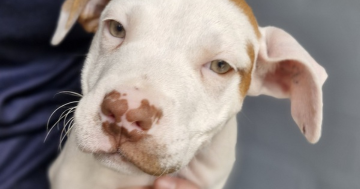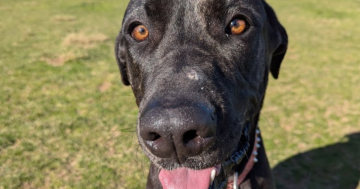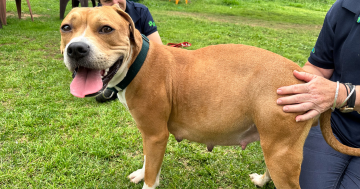
Clayton’s up for adoption at RSPCA ACT – but this working dog will require a lot of mental stimulation and exercise. Photo: RSPCA ACT.
It will surprise no one that I am not my friends’ first choice when it comes to chatting about pets.
As an animal welfare warrior with zero filter when it comes to the ethics of pet ownership, I’ve thrown more than one nose out of joint with my views on purchasing pedigree puppies, not taking dogs for daily walks, and it’s best to not get me started on roaming cats in dense urban environments.
But if I wasn’t comfortable with backlash, I probably wouldn’t write public opinion pieces on a weekly basis, and I have to get another animal-related gripe off my chest.
Recently, I’ve noticed quite a few peers from my generation claiming that they have their pets (or want one) for their own mental health.
Whether its to manage their depression, anxiety or just loneliness, or in the case of fellow friends in the equestrian community, to give them a sense of purpose and achievement, it seems millennials are quick to take on the care and responsibility for another living creature with their own satisfaction in mind.
Don’t get me wrong – pets can be truly remarkable for our mental health. I know that my dog and cat are huge factors in my wellbeing, both in terms of being a source of joy and affection in the home, but also as a way of getting me out and about and giving our household a routine. The horses (of which I have three) also keep me super active and provide a lot of joy and satisfaction.
But these are side benefits, and don’t eclipse the primary importance of their welfare. Just as we benefit from having pets, they must benefit from our care and ownership. It’s a symbiotic relationship, or at least it should be, but I’m questioning whether everyone necessarily sees it that way.
I know people with highly active working dog breeds because they ‘love Border Collies’, but who won’t provide their dogs with the high level of physical and mental stimulation they need to be happy. Instead, they languish in backyards or dog runs, are not allowed inside, and instead act as a sort of lawn ornament.
I know people who bought highly expensive pedigree puppies because they love the look of the breed without doing the necessary work and research, and now have big, sensitive and reactive dogs on their hands that they have no idea how to cope with. But the breed connected to their ‘childhood’ or was their ‘dream dog’, which apparently justifies it.
I know people who refuse to adopt older cats or dogs, not because they are concerned they won’t be able to meet their needs as they age, but because they ‘couldn’t handle the pain of their loss’. So they get a puppy or a kitten, which they’re rarely prepared for, as though that animal will stay young forever, while older animals struggle to get adopted from shelters.
And I also know people who have their pets for their mental health. When their mental health is suffering, their pets do too – dogs staying unwalked for weeks at a time, horses not being seen or exercised for long periods, or worse, animals that clearly need to be euthanised due to old age and pain and are instead forced to limp along until they drop dead of their own accord because their owner couldn’t face the trauma of making the decision.
I can’t stress this enough – animals are not toys or tools for our benefit. Yes, we all have pets because we selfishly want them. They make us happy, they’re cute, etc. But in exchange for those benefits, we owe them responsibility, an understanding of their individual needs and a promise to do no harm to them.
They rely entirely on our good natures for their wellbeing, and their mental and physical health should always come first over our own.





















